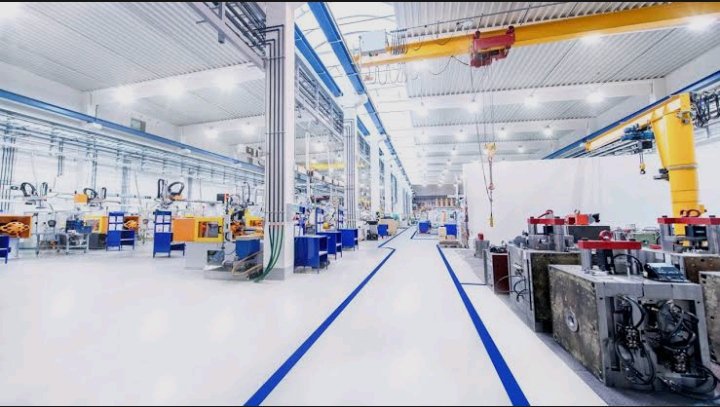Capital goods is a promising career path in 2025, offering opportunities in industries like manufacturing, engineering, and technology.
It involves creating machinery, tools, and equipment used to produce consumer goods.
This field provides competitive salaries, career growth, and the chance to work with innovative technologies.
While some roles may require technical expertise, entry-level positions and on-the-job training make it accessible to many.
Grab a chilled glass of water and keep reading….
ALSO READ: Is Air Freight/delivery Services a Good Career Path in 2025
What Are Capital Goods?

Goods are classified into two main categories: capital goods and consumer goods.
- Consumer goods are products or services purchased directly by customers for personal use.
- Capital goods, also called durable goods, are items used to produce consumer goods or to provide services for another business.
Key Characteristics of Capital Goods
- Often referred to as property, plant, and equipment (PPE) or fixed assets.
- Some items can be classified as both capital goods and consumer goods, depending on how they are used.
Examples to Differentiate Capital and Consumer Goods:
- Hammer:
- Consumer good: Used at home to hang a picture.
- Capital good: Used on a construction site to build homes.
- Laptop:
- Consumer good: Purchased by a student for personal use.
- Capital good: Purchased by a company for employees to complete work.
Examples of Capital Goods;
- Machinery used to create toys.
- Forklifts used in supermarket warehouses.
- Buses used for public transportation.
- Assembly line equipment for making computers.
- Chemicals for cleaning business locations.
- Lawnmowers used by lawn care companies.
- Microwaves used in restaurants.
- Fabric used to make clothing.
- Fuel to power manufacturing equipment.
- Telecommunications equipment for business operations.
- Tools and parts used to create automobiles.
Is Capital Goods a Good Career Path?
The suitability of a career in capital goods depends on your preferences and career goals.
Capital goods include machinery, equipment, tools, buildings, and vehicles used by companies to produce goods and services.
A career in this field involves the manufacturing, development, and sale of these industrial goods, often for industries such as automotive, aviation, or energy.
Advantages of a Career in Capital Goods
- Entry-Level Opportunities
- Minimal experience is often sufficient to start.
- Roles such as production assistant, quality control inspector, or machinist provide foundational experience.
- On-the-job training is common, equipping you with technical skills and industry knowledge.
- Dynamic Work Environments
- Roles vary from design and production to supply chain management.
- Workspaces include offices, factories, and construction sites.
- Technology-driven advancements make projects engaging and innovative.
- Contribution to Society
- Positively impacts the economy by producing essential products.
- Aligns with personal values, such as sustainability or renewable energy initiatives.
- Career Advancement
- Growth opportunities include roles like control manager, welding inspector, or industrial designer.
- Potential for international opportunities in global companies.
- Certifications (e.g., from IMechE) and higher degrees enhance career prospects.
- Competitive Salary
- Senior roles often offer competitive pay, bonuses, and commissions.
- High demand for skilled professionals ensures attractive compensation packages.
- Networking Opportunities
- Large companies enable connections with industry experts.
- Collaboration across departments fosters strong internal networks.
Disadvantages of a Career in Capital Goods
- Challenging Work Environments
- Exposure to dust, hazardous chemicals, and extreme conditions in factories or sites.
- Requires strict adherence to safety protocols.
- Long Working Hours
- Strict deadlines may demand overtime or working nights and holidays.
- Projects often require meticulous attention to detail.
- Physical Strain
- Tasks can involve heavy lifting or awkward positions, leading to fatigue and muscle strain.
- Regular exercise and proper techniques reduce risks.
- Risk of Injury
- Operating heavy machinery or working in irregular conditions increases the risk of accidents.
- Following safety standards and seeking medical attention can mitigate dangers.
- Limited Creativity
- Focus on functionality may make tasks repetitive.
- Creativity can be incorporated into solving technical challenges.
Requirements for a Career in Capital Goods
- Specialised Knowledge
- Degrees in fields like engineering are often essential.
- Familiarity with industry tools such as automation systems or CAD software is advantageous.
- Technical Skills
- Proficiency in areas like robotics, automation, and equipment handling.
- Awareness of safety protocols is crucial.
- Soft Skills
- Communication, teamwork, and project management skills are vital for success.
Best Paying Jobs in Capital Goods Production (Arranged by Salary)
The capital goods industry offers a variety of jobs with diverse responsibilities, all contributing to the production of goods used by other businesses.
Below is a list of jobs, ranked by national average salary, along with their primary duties.
1. Engineering Manager
- National Average Salary: $120,818 per year
- Primary Duties:
- Manage capital expenditures, budgets, and efficient processes.
- Oversee engineering teams and contractors to meet organizational goals.
- Ensure workplace safety and security.
- Lead the design and development of engineering projects.
2. Software Developer
- National Average Salary: $108,896 per year
- Primary Duties:
- Develop and troubleshoot software for machinery and equipment.
- Modify or create programs to align with business goals.
- Research best practices and collaborate with leaders for updates.
3. Electrical Engineer
- National Average Salary: $95,119 per year
- Primary Duties:
- Design, test, and maintain electrical systems and machinery.
- Conduct research and document testing processes.
- Oversee electrical teams to ensure effective and efficient operations.
4. Quality Assurance Manager
- National Average Salary: $78,843 per year
- Primary Duties:
- Monitor manufacturing processes for quality standards.
- Identify inefficiencies and ensure safety compliance.
- Oversee teams to maintain high output and cleanliness in the workplace.
5. Manufacturing Technician
- National Average Salary: $60,201 per year
- Primary Duties:
- Operate and maintain production equipment.
- Troubleshoot issues and ensure safety compliance.
- Maintain productivity by logging and addressing operational updates.
6. General Operations Manager
- National Average Salary: $59,777 per year
- Primary Duties:
- Manage employees and oversee business operations.
- Set short- and long-term goals and manage budgets.
- Ensure high-quality output and address escalated client issues.
7. Fabricator
- National Average Salary: $53,175 per year
- Primary Duties:
- Assemble components of products using blueprints.
- Manipulate materials (e.g., steel, plastic) and operate tools.
- Maintain cleanliness and safety in the workspace.
8. Customer Service Representative
- National Average Salary: $38,964 per year
- Primary Duties:
- Act as a point of contact for customers and resolve issues.
- Liaise between consumers and company representatives.
- Build client relationships and handle administrative tasks like invoices.
9. Warehouse Worker
- National Average Salary: $32,103 per year
- Primary Duties:
- Fulfill, pack, and ship orders accurately.
- Load and unload delivery vehicles and maintain a clean workspace.
- Ensure compliance with workplace safety standards.
ALSO READ: Is Electric Utilities Central A Good Career Path in 2025?
Is Capital Markets a Good Career?
Roles in capital markets are fast-paced, highly competitive, and can be extremely lucrative for individuals with the right skills.
Sales associates are often recruited from top-tier undergraduate programs worldwide, making it an attractive career for ambitious and skilled professionals.
Do Capital Goods Have a Demand?
Capital goods are in demand by businesses, companies, and manufacturers, while consumer goods are purchased by individuals.
Consumer goods have a direct demand because they directly meet consumer needs. In contrast, capital goods have a derived demand as they indirectly satisfy consumer needs by being used to produce consumer goods.
Summary:
If you’re looking for a high-paying role, positions like engineering manager and software developer are ideal.
For entry-level roles, consider jobs such as warehouse worker or customer service representative, which can offer a pathway into the capital goods industry.
ALSO READ: What Is Not Taken Into Account When Determining A Person’s Career Path?










